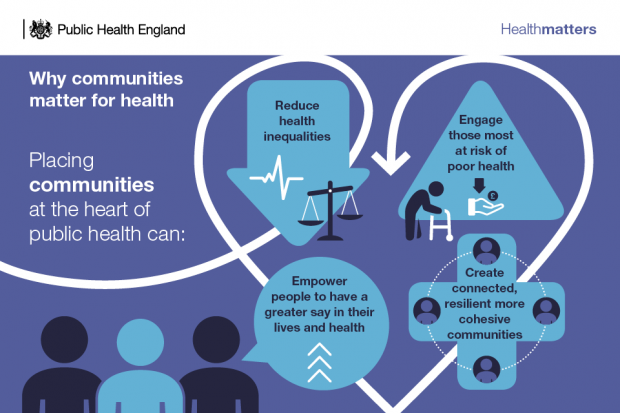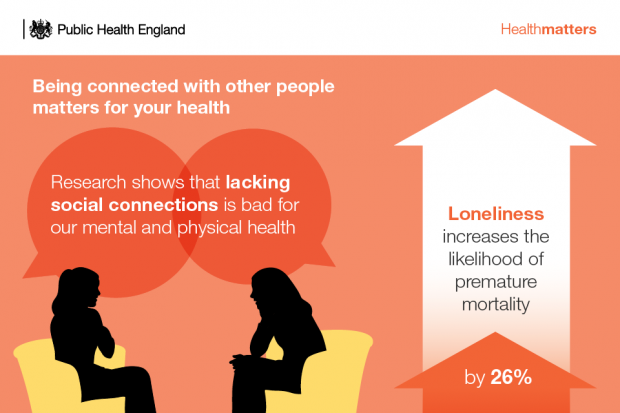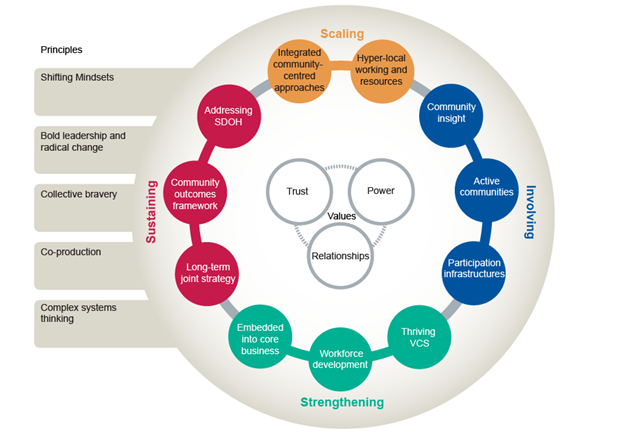
Whether we live in cities or towns, rural or coastal areas, the communities we live in really matter for our wellbeing.
They matter because things like having a job, a decent and safe home, strong social networks and a sense of belonging play a big role in ensuring we live a happy life in good health.
The recent general election prompted much debate about the importance of communities and places and the need to listen and work alongside communities to achieve inclusive growth and prosperity in every part of England.
So, as we move into 2020, with renewed attention on communities and places, including through directors of public health, combined authorities, elected mayors and new integrated care systems, the time is right to focus on how local areas work together to build communities where everyone has the same opportunities to lead a healthy life.
Community-centred approaches to improve health and wellbeing
When we talk about “communities” we use this as shorthand for relationships, bonds, identities and interests that join people together and give them a shared stake, for instance, in a place, or a service or a culture.
And if you’re wondering “what have communities got to do with health?” the answer is simple and the evidence compelling.

Community life, having friends and social connections and having a voice in decisions that affect you are all vital to your wellbeing. They provide you with feelings of control, provide a buffer against illness or help you manage existing health conditions better.
If you look at the other side of the coin you see that feeling isolated or powerless is damaging to physical and mental health. Loneliness actually increases our chances of dying early.

Effective community-centred approaches which improve health and wellbeing are about involving and empowering local communities, particularly disadvantaged or seldom heard groups.
But this goes well beyond simply asking people for their opinion.
A genuine community-centred approach involves finding out what people want and need, getting communities fully involved in the decisions that affect them as well as creating opportunities for volunteer and peer roles for local people.
The best examples we see across England recognise that every area has all manner of “assets” that can boost community life, whether that’s existing voluntary groups, clubs and organisations or the skills, experience and social networks of local people themselves as well as physical, environmental or economic assets (such as buildings and facilities through to available budgets).
Building healthy, resilient and connected communities
There are a wide range of resources available for professionals who want to take this agenda forward and build healthy, resilient and connected communities across their local system and reduce persistent health inequalities.
PHE has built on our existing guidance on community-centred approaches by conducting new research, drawing on learning from local areas that are already working in a whole system way in order to have greater impact.
We’ve used the research to help us understand the key elements, core values and principles that are driving progress and our findings can be read via a briefing or a supporting slide deck.

We hope the insights gained from local leaders we interviewed will be useful for any government, NHS, community or voluntary professional at local, regional or national level with an interest in scaling community-centred approaches and having greater impact on health inequalities
This work is part of PHE’s recently published ‘Place-Based Approaches to Reducing Health Inequalities’, which advocates action at community, civic and service levels.
And alongside the guidance mentioned above you can also access a collection of practice examples and a list of whole-systems frameworks on PHE’s online library.
Boosting our own community of interest
We’re keen to engage with local areas who are considering or implementing community-centred approaches. You can do this by emailing us, joining our Knowledge Hub group or taking part in a range of webinars we have planned for 2020. We’ll promote these webinars via Knowledge Hub and through social media, so keep a lookout throughout the year.
